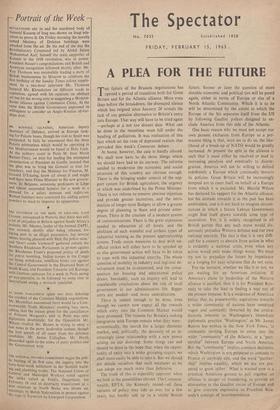A PLEA FOR THE FUTURE
Fri HE failure of the Brussels negotiations has I opened a period of transition both for Great Britain and for the Atlantic alliance. More even than before the breakdown, the dismayed silence which has reigned since January 28 reveals the lack of any genuine alternative to Britain's entry into Europe. That way will have to be tried again —perhaps at a not too distant date. What can be done in the meantime must fall under the heading of palliatives. It was realisation of this fact which set the tone of depressed realism that pervaded this week's Commons debate. At home, however, the case is hardly altered. We shall now have to do those things which we should have had to do anyway. The reforms needed to modernise the economic and social structure of this country are obvious enough. There is the bringing under control of the sup- port system for British agriculture, the urgency of which was underlined by the Prime Minister. There is tax reform to remove obvious injustices and provide greater incentives, and the intro- duction of longer-term Budgets to allow a greater degree of planning in State and private enter- prises. There is the creation of a modern system of communications. There is the great expansion needed in education at all levels, and the abolition of such wasteful and archaic types of industrial training as the present apprenticeship system. Trade union measures to deal with un- official strikes will either have to be speeded up or else government action will have to be taken to cope with this industrial anarchy. The whole question of mobility in industry and regional de- velopment must be re-examined, and the conse- quences for housing and educational policy drawn. Inevitably, such an inquiry will lead to unpalatable conclusions about the role of local government in our administrative life. Bigger units are needed—and more centralisation.
There is indeed enough to be done, even though we cannot now expect all the rewards which entry into the Common Market would have promised. The reasons for Britain's seeking integration with Europe remain what they were economically, the search for a larger domestic market, and, politically, the necessity of an in- creasingly close relationship with a new power arising on our doorstep. Some things can and should be done in the hope that, when the oppor- tunity of entry into a wider grouping occurs, we shall more easily be able to take it. But we should not delude ourselves that such measures as we can adopt are much more than defensive.
The truth of this is especially apparent when we look at the possibilities abroad. The Common- wealth, EFTA, the Kennedy round—all these variants of policy may tide us over for a few years, but hardly add up to a viable British future. Sooner or later the question of more durable economic and political ties will be posed again, either in terms of Europe or else of a North Atlantic Community. Which it is to be will be determined by the extent to which the Europe of the Six separates itself from the US by following Gaullist polices designed to ex- clude America from this side of the Atlantic.
One basic reason why we must not accept our own present exclusion from Europe as a per- manent thing is that, were we to do so, the like- lihood of a break-up of NATO would be greatly increased. At present the split in the alliance is such that it must either be resolved or lead to increasing paralysis and eventually to disinte- gration. America will not be willing to defend indefinitely a Europe which continually thwarts its policies. Great Britain will be increasingly tempted not to exert itself on behalf of a Europe from which it is excluded. Mr. Harold Wilson has declared his support for the Atlantic alliance, but his attitude towards it in the past has been ambivalent, and it is not hard to imagine circum- stances in which a future Labour Government might find itself drawn towatds some type of neutralism. Yet, it is widely recognised in all British parties that any such move would dis- astrously prejudice Western defence and our own national interests. The fact is that it is very diffi- cult for a country to abstain from action in what is evidently a national crisis, even when any action would only make things worse. We must try not to prejudice the future by impatience or a longing for easy solutions that do not exist.
For the moment, whether we like it or not, we are waiting for an American initiative. If America's claim to leadership of the Western alliance is justified, then it is for President Ken- nedy to take the lead in finding a way out of the present impasse. It is a weakness of American policy that its praiseworthy aspirations towards a wider community of nations have remained vague and constantly thwarted by the contra- dictions inherent in Washington's immediate diplomatic practice. 'Washington,' as Mr. James Reston has written in the New York Times, 'is constantly inviting Europe to come into the wider "community" of the Atlantic, or a "part- nership" between Europe and North America. But the "community" implies common decisions, which Washington is not prepared to concede to France or anybody else, and the word "partner- ship" implies equality, which we are not pre- pared to grant 'either.' What is wanted now is a practical American gesture to pull together an alliance in danger of foundering, to provide an alternative to the Gaullist vision of Europe and to give concrete expression to President Ken- nedy's concept of interdependence.


































 Previous page
Previous page